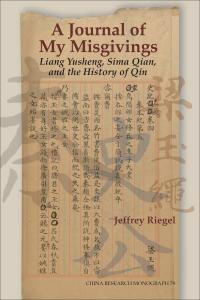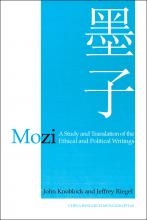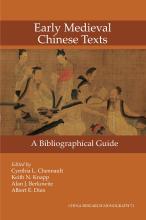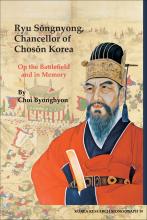A Journal of My Misgivings
A Journal of My Misgivings
Jeffrey Riegel
View sample pages
Errata and Addenda
For best viewing of the charts and tables in the supplement, click here to open the file, then download to read in a PDF reader.Online Supplement
According to Professor Chen Kanli of Peking University: “Professor Riegel proves that no matter whether one studies the Shiji or the historical periods it covers, one cannot avoid Liang Yusheng, though his work has in the past been slighted and disregarded.... He has contributed to the academic world a book that must be consulted when reading the Shiji zhiyi and the Shiji, or when studying the history of Qin. For the sinological community, this book is as important as Liang’s original (or perhaps even more so).”
As a nonprofit academic press, we need your support to publish our books. Your gift can help us make more of our titles available as e-books. DONATE NOW
Title information
A Journal of My Misgivings about the Records of the Grand Historian (Shiji zhiyi 史記志疑), written by Liang Yusheng 梁玉繩 (1745–1819), is a detailed analysis and critique of the Shiji 史記 of Sima Qian 司馬遷 (b. 145 BCE). Sima Qian had composed a masterful survey of the ancient dynasties and ruling houses from legendary times until the second century BCE, and filled it with anecdotes, short biographies, lineages, legends, and learned treatises as well as his own observations and opinions. Because the scope of Liang’s Journal is as broad and complex as the Shiji, Jeffrey Riegel’s study of it focuses on Liang’s critiques of those parts of the Grand Historian’s Records relating to the slow rise and precipitous fall of Qin, weaving Liang’s scholarship into a revision of Sima Qian’s narration of the five-hundred-year transformation of Qin from marginal state to hegemonic power. Riegel first provides an account of Liang’s life in Qing dynasty Hangzhou and a study of his methodology and sources before turning to revisions of what the Shiji says about Qin’s origins, the state’s ruling lineage, and its later kings and emperors, as well as the geography of the Qin state and empire, and the almost countless battles from which Qin emerged as ultimate victor in 221 BCE. The foundation of Riegel’s revisions to Qin history is the Shiji zhiyi, but on occasion Riegel supplements, corrects, and updates Liang’s scholarship by referring to the numerous archaeological discoveries that have dramatically altered our understanding of what happened in the history of early China. An appendix to the volume summarizes Liang’s valuable studies of early Chinese chronology. Other appendixes (that appear in an online supplement) provide further details on Liang’s corrections to Sima Qian’s text and include a Finding List of the relevant Shiji passages on the Qin, Liang’s scholarship, and other commentaries and translations.
Jeffrey Riegel
Jeffrey Riegel is professor emeritus of East Asian Languages and Cultures at the University of California, Berkeley. He is also professor emeritus of the School of Languages and Cultures at the University of Sydney. His research focuses on classical Chinese literature and early Chinese texts. He has studied and translated the Annals of Lü Buwei and Mozi.
M.A., Chinese, Stanford University; Ph.D., Chinese, Stanford University
A Journal of My Misgivings
Preface ix
Abbreviations, Maps, Tables, and Technical Notes xv
I. Liang Yusheng and the Composition of A Journal of My Misgivings
1 The Life and Legacy of Liang Yusheng 3
2 The Methods and Sources of an Eighteenth-Century Historian 50
II: Qin History Revised
3 The Founders of the Qin Ruling Lineage and Their Heirs 123
4 Kings and Emperors 197
5 The Cultural and Administrative Geography of Qin 294
6 Warfare 367
Liang Yusheng on Shiji Chronology 465
Epilogue: Liang Yusheng and the Shiji 489
Bibliography 495
Index 523
ONLINE SUPPLEMENT
http://ieas.berkeley.edu/
Appendixes and Tables
1. Liang Yusheng’s Notes on the Guo Qin lun of Jia Yi
2. Textual Criticism and the Making of the Zhonghua shuju Edition of the Shiji
Finding List
|
JOURNAL REVIEWS |
|
Review [translated] by Chen Kanli 陳侃理, Professor of History, Peking University “The chapters in Sima Qian’s Shiji (Records of the Grand Historian) that relate to the history of Qin are unique and unequalled historical materials; and yet, because of an extreme lack of corroborating evidence, doubts about their reliability have arisen. In A Journal of My Misgivings, Jeffrey Riegel has with special discernment chosen such doubtful Shiji passages in order to examine the scholarly approach and contributions of the Shiji zhiyi [Liang Yusheng’s 18th-century criticism of Sima Qian’s work]. Professor Riegel on the one hand both describes in broad strokes the intellectual movements of the Qing dynasty as well as deeply explores the resources Liang Yusheng relied on and the distinctive features of his life. On the other hand, he absorbs the results from the latest archaeological discoveries and research on unearthed documents and judges with precision the successes and failures of Liang's work. Professor Riegel pertinently points out that Liang Yusheng’s revision of the text of the Shiji was deeply influenced by the research methodology prevalent during the Qianlong and Jiaqing reign periods of the Qing and that Liang’s forthright criticism of Sima Qian adopted the stricter historical standards of its “truth-seeking,” although sometimes Liang was not immune from the influence of his own biases. Through meticulous philological work, Professor Riegel’s book makes readers aware of the extent to which the Shiji zhiyi has influenced the current popular editions of the Shiji (and the appendix provided online lists one by one the corrections made by the Zhonghua shuju editors based on Liang Yusheng's textual notations). Professor Riegel proves that no matter whether one studies the Shiji or the historical periods it covers, one cannot avoid Liang Yusheng, though his work has in the past been slighted and disregarded. Just as Liang Yusheng “performed outstanding service” to Sima Qian so has Jeffrey Riegel “performed outstanding service” to Liang Yusheng. He has contributed to the academic world a book that must be consulted when reading the Shiji zhiyi and the Shiji, or when studying the history of Qin. For the sinological community, this book is equally as important as Liang’s original (or perhaps even more so).” |
|
“Jeffrey Riegel’s monumental work on the Qing historian Liang Yusheng 梁玉繩 (1745–1819) is the first book-length study of a single work of Qing kaozheng 考證 scholarship published in any Western language.... While the first part describes the historian in a general sense, the second one deals with concrete issues of Qin history. There, Riegel shows in great detail the methods that Liang Yusheng used in order to correct what he perceived as errors in Sima Qian’s text.... Riegel masterly presents us with the traditional history of the Qin dynasty as well as with the many elements that we have come to know about it due to archeological discoveries in more recent times.” ~Hans van Ess, Ludwig Maximilians-Universität, München, in T’oung Pao 110 (2024): 487–518 (doi:10.1163/15685322-11003006). |
|
"Having devoted decades to Liang Yusheng, Riegel, in compiling this large and densely written volume, intimately recreates the practice of a Qing evidence scholar. But in the end, his reenactment is not a simple replica, but a close-up case study of Qing scholarship—one that not only reconstructs its content, but also reveals the context in which it was created and situated. As a result, Riegel makes a unique and valuable contribution to the field of Qing intellectual history in any language." ~Q. Edward Wang, Rowan University, in Journal of Chinese History (2025), 1–3 (https://doi.org/10.1017/jch.2024.35). |




